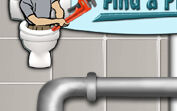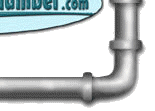
|
- Place a strainer over kitchen and bathroom drains if they do not already have one; this will prevent hair, pieces of soap, and other debris from clogging drains. Clean the strainer as needed.
- Unclog a drain mechanically rather than chemically when possible.
- Use chemical drain cleaners sparingly, especially if your pipes or traps are brass, steel, or cast-iron; some chemicals may corrode metal pipes. Try this instead: pour a cup of baking soda followed by a cup of vinegar down your drain every month.
- The drains in showers and in bathroom sinks typically need extra care; pour two or three gallons of boiling water down each bathroom drain about once a month to clear out hair and greasy particles.
- Every week or two remove sink and tub pop-up stoppers and rinse them off.
- Every three or four months remove the overflow plate on the tub.
- Then pull up the pop-up assembly to reach the spring or rocker arm.
- Remove accumulated hair and rinse thoroughly.
- If your shower drain is plugged up:
- Try a plunger first.
- If the plunger doesn't unplug the drain, insert a plumber's helper ("snake") down the drain.
- Prevent drain clogs by putting a lint trap on your washing machine discharge hose.
- When you are ready to find a plumber in your own neighborhood, simply enter your zip code to begin your search:
|
When you are ready to find a plumber in your neighborhood, simply enter your zip code to begin your search:
|
Return to
Plumbing Tips
Menu
|
|















